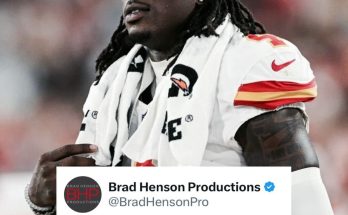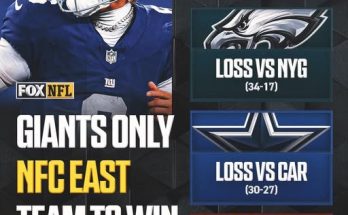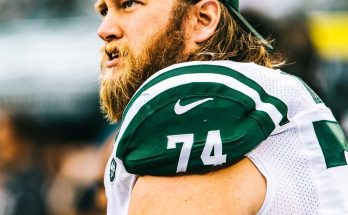Todd Bowles is all of us watching this play. You sit on the edge of your seat, eyes wide, heart half-beating out of your chest, a cocktail of confusion, disbelief, and exasperation brewing in your gut. There’s a kind of pain that only football can induce—a mix of helplessness and frustration that comes from seeing something so easily preventable unravel in front of millions. That’s the kind of moment this was. And as the camera cuts to Bowles, standing there with that all-too-human look—equal parts frozen, disappointed, and completely out of answers—you realize: that’s me. That’s all of us.
You know the one. It’s the blown coverage, the missed tackle, the inexplicably conservative call on 3rd and short, or worse—total offensive ineptitude in a moment that demanded anything but. A breakdown so obvious, so fundamentally wrong, that your first reaction isn’t even anger. It’s disbelief. A subtle, sinking feeling that starts somewhere in your chest and drifts all the way down to your stomach. Bowles’ expression doesn’t scream. It doesn’t throw a clipboard or launch a headset. It just sits there in stunned, wounded silence. Because what else is there to say? Sometimes you don’t yell when things fall apart—you just blink, and try to make sense of the wreckage.
You can tell in that moment that Bowles is asking the same questions we are. What just happened? Why did it happen? Why—after all the preparation, the reps, the meetings, the walk-throughs, the film sessions, the game plans—why did it fall apart here? In real time, you can see the synapses firing behind his eyes, running through every possible answer, knowing deep down there’s nothing he can do about it anymore. The damage is done. The points are on the board. The game has changed.
That look—it’s the universal football fan reaction. It transcends fanbases, rivalries, and hometown loyalties. It’s the face you make when your team, against all odds and sense, decides to bring a three-man rush against a quarterback who’s been slicing you up all game. It’s the face when your safety bites on a double move with no help over the top. It’s the face when the offense calls a screen on 3rd and 12 and gains exactly nothing. It’s not just confusion; it’s a reluctant acceptance that somehow, in spite of logic, in spite of everything you’ve learned about the game, this is what happened.
And it’s even more brutal when you’re in Bowles’ shoes. You’re not just watching the play—you’re responsible for it. There’s no way out. No one else to point to. Even if the mistake wasn’t your direct doing, it happened on your watch. In a league where jobs are defined by wins and losses, moments like these aren’t just embarrassing. They’re damning. You’re standing there, headset on, and you know every camera is on you, looking for a reaction. Looking for leadership. Looking for answers. But what can you give them when you don’t have any for yourself?
You’ve seen it before. Coaches trying to mask their disappointment with rage. Others burying their heads in their play sheets. Some just turn and walk away, hoping to outrun the memory of what just occurred. But Bowles stands there, motionless. And that’s what makes it so relatable. Because that’s what we do, too. We stare. We pause the replay. We rewind. We watch it again, hoping it looks different the second time. Hoping it makes more sense. But it never does.
This moment—this snapshot of football pain—connects us in a way that few things can. It reminds us that football, for all its complexity and planning, is still a game played by human beings, run by fallible coaches, subject to chaos. The best-laid plans can crumble in seconds. The perfect call can be ruined by a single lapse in execution. The right play can still fail because the game, like life, doesn’t care how prepared you were. All that matters is what actually happened when the ball was snapped.
In that one moment, Todd Bowles becomes not the head coach of an NFL team, but a stand-in for all of us. He is the everyman. The exasperated fan. The helpless dad in the stands watching his kid miss a layup. The weekend warrior who runs the perfect route and drops the ball anyway. The coach who spent hours crafting a plan, only to watch it evaporate in three seconds. He becomes a mirror, showing us our own despair, our own confusion, our own helpless love for this brutal, beautiful sport.
Because we care. That’s what it all comes down to. If we didn’t care, we wouldn’t feel this. If Bowles didn’t care, he wouldn’t be standing there looking like he just got hit by a truck of disappointment. That stunned silence, that slack-jawed gaze—it only happens because he gave everything to this. Just like we give everything on Sundays, too. We yell at the screen. We pace the room. We check Twitter. We call our friends to vent. We replay the moment over and over, trying to make peace with the injustice of it all. And still, we feel the sting.
Football does this to us. It humbles us. It teases us with hope and rips it away without warning. One play can unravel an entire afternoon. One mistake can cancel out three quarters of brilliance. It’s a game of inches, sure—but it’s also a game of emotions, and sometimes the smallest misstep causes the biggest emotional landslide. Bowles, in that frame, wasn’t reacting to just one play. He was reacting to the cumulative weight of what that play meant. The shift in momentum. The shift in narrative. The loss of control.
We’ve all been there. It’s the same look you gave when your team missed the game-winning field goal. When they threw the pick-six with under two minutes left. When the ref made the worst call you’ve ever seen. When the game, and all your expectations with it, slipped through your fingers in slow motion. Todd Bowles was just living it on national television, in front of millions of fans, reporters, and critics. And instead of screaming, instead of breaking down, he just… looked. Stunned. Defeated. But still there. Still watching.
And isn’t that what we do too? We keep watching. Even when it hurts. Even when we know the game’s lost. Even when the play makes no sense. Even when we swear we’re done, that this team will be the death of us, that we won’t tune in next week—we still do. Because despite the heartbreak, despite the agony, despite moments like this one, we love it. We live for it. It’s the pain that makes the highs so high. It’s the disbelief that makes the magic possible.
Todd Bowles was all of us in that moment because he did what we all do when football hits us where it hurts: he stood there, silent, wearing a face that said everything. A face that said, “Did that really just happen?” A face that said, “I don’t understand.” A face that said, “We practiced this. We drilled this. How could it fall apart now?” And most importantly, a face that said, “I care.”
Because if you didn’t care, it wouldn’t hurt. And if it didn’t hurt, football wouldn’t matter. But it does. It matters in ways we don’t even fully understand. It’s not just a game—it’s a reflection of everything we value. Hard work. Planning. Execution. Sacrifice. Grit. And when it all fails, it reminds us that we’re human, that life isn’t fair, and that sometimes things just go wrong. That’s what was written all over Bowles’ face. Not just disappointment—but humanity.
So yes, Todd Bowles is all of us watching this play. He is the embodiment of every groan, every gasp, every stunned silence we’ve ever given to this sport. He is the pause after the interception. The silence after the blown coverage. The disbelief after the boneheaded call. He is the pause button on our hope, the crash of reality into expectation. But in that moment, he’s also a reason we keep coming back. Because we see ourselves in him. Because we’ve been there. And because, deep down, we know we’ll be there again.


